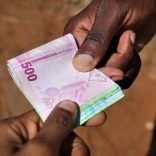FACIM 2025: Mozambican firms sign over 800 business and investment agreements
Mozambique: Business Activity PMI Index fell in March

File photo: Lusa
The PMI Mozambican business activity index dropped in March to 50.6, down from 51.2 in February, but remained above the 50.0 neutral mark for a second consecutive month, announced the Standard Bank, which conducts the survey.
According to the analysis note, “the drop in the index came amid weaker expansions in output, new orders and stocks of purchases”.
“The March PMI survey data indicated a milder improvement in operating conditions in the Mozambique private sector, as businesses reported a softening of demand growth and only a marginal rise in activity. At the same time, input costs increased for the first time in three months amid rises in fuel and raw material prices. Strong hiring growth also led to an uplift in staff wages, which firms passed on to customers through higher selling prices. With the threat of inflationary pressures harming future output, plus increased global uncertainty due to the war in Ukraine, business confidence was at its lowest level since March 2021,” the report reads.
“Output at Mozambican companies grew for the second month running in March, signalling a further recovery from the COVID-19 lockdown at the start of the year. However, the uplift in activity was only marginal. According to the survey panel, output momentum was largely based on new order book volumes, which also rose to a lesser extent than in February. Sector performances were notably split, with new business growth in wholesale and retail and services contrasting with falls across agriculture, manufacturing and construction,” it adds.
“Suppliers’ delivery times continued to improve in March as businesses highlighted greater flexibility among vendors. In turn, firms raised their input purchases for the first time since last November, helping to expand stock levels. Following a slight drop in February due to the Omicron wave, Mozambican firms were able to add to their workforces at the end of the first quarter. Employment growth soared to an eight-month high, contributing to a further modest rise in salary costs,” the report continues.
“Finally, the outlook for business activity dimmed in March amid concern over global inflationary pressures and the war in Ukraine. Overall sentiment was at its lowest for exactly a year, but remained strongly positive, with around 57% of firms expecting output to grow,” it concludes.
Fáusio Mussá, the bank’s chief economist, estimates in the report that Mozambique’s economic growth in the first quarter stood at 3%.
“We maintain that growth has decelerated towards 3.0% year-on-year during Q1:22, from 3.3% during Q4:21,” notes Mussá, at a time when official data from the Mozambican National Institute of Statistics (INE) is still to come.
“Several regions in Mozambique have been hit by heavy rains and bad weather since the beginning of the year, which caused crop and infrastructure damage, weakening both aggregate supply and demand,” Mussá adds.
The economist also says that ” the recent fuel price adjustment and higher imported food costs elevates inflation risks which could negatively impact the economic recovery”.
Likewise, “recent policy rate hike by 200bps to the level of 15.25% will likely negatively impact GDP growth, even considering the impact of an expected rise in external assistance related to the IMF funded program and progress on the natural gas projects investment”.
The Purchasing Managers’ Index (PMI) published by Standard Bank is collated from responses from purchasing directors at a survey panel of nearly 400 private sector companies.
- You may read / download the full Standard Bank Mozambique PMI™ document ” Business conditions improve only slightly in March” HERE.












Leave a Reply
Be the First to Comment!
You must be logged in to post a comment.
You must be logged in to post a comment.